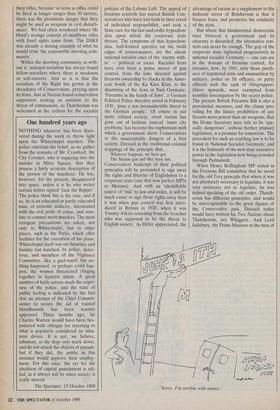One hundred years ago
NOTHING whatever has been disco- vered during the week to throw light upon the Whitechapel murders. The police entertain the belief, as we gather from the remarks of Mr. Crawford, the City Coroner, who is inquiring into the murder in Mitre Square, that they possess a fairly accurate description of the person of the murderer. He has, however, for the present, disappeared into space, unless it is he who writes certain letters signed 'Jack the Ripper'. The police think this is the case, and if so, he is an educated or partly educated man, of extreme audacity, intoxicated with the evil pride of crime, and reso- lute to commit more murders. The most stringent precautions are taken, not only in Whitechapel, but in other places, such as the Parks, which offer facilities for the execution of his plans. Whitechapel itself was on Saturday and Sunday last watched, by police, detec- tives, and members of the Vigilance Committee, like a gaol-ward; but no- thing happened, or perhaps could hap- pen, the women threatened clinging together in hysteric alarm. A great number of futile arrests mark the eager- ness of the police, and the state of public feeling is indicated by the fact that an attempt of the Chief Commis- sioner to secure the aid of trained bloodhounds has been warmly approved. Three months ago, Sir Charles Warren would have been bes- pattered with obloquy for resorting to what is popularly considered an inhu- man device. It is not, we believe, inhuman, as the dogs only mark down, and do not attack the objects of pursuit; but if they did, the public in this instance would approve their employ- ment. For this once, the cry for the abolition of capital punishment is stil- led, as it always will be when society is really moved.
The Spectator, 13 October 1888


























































 Previous page
Previous page